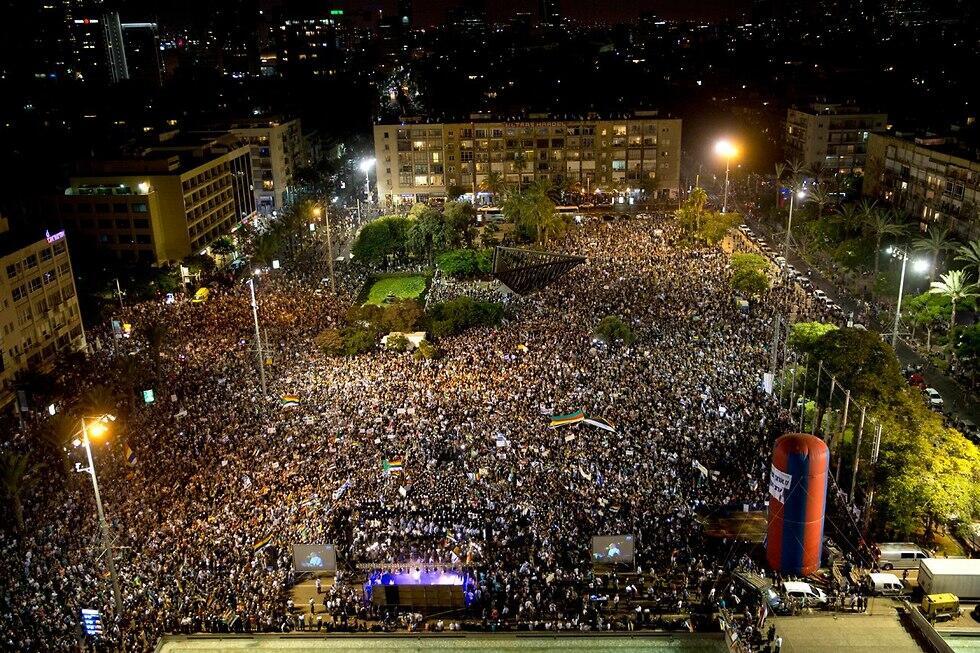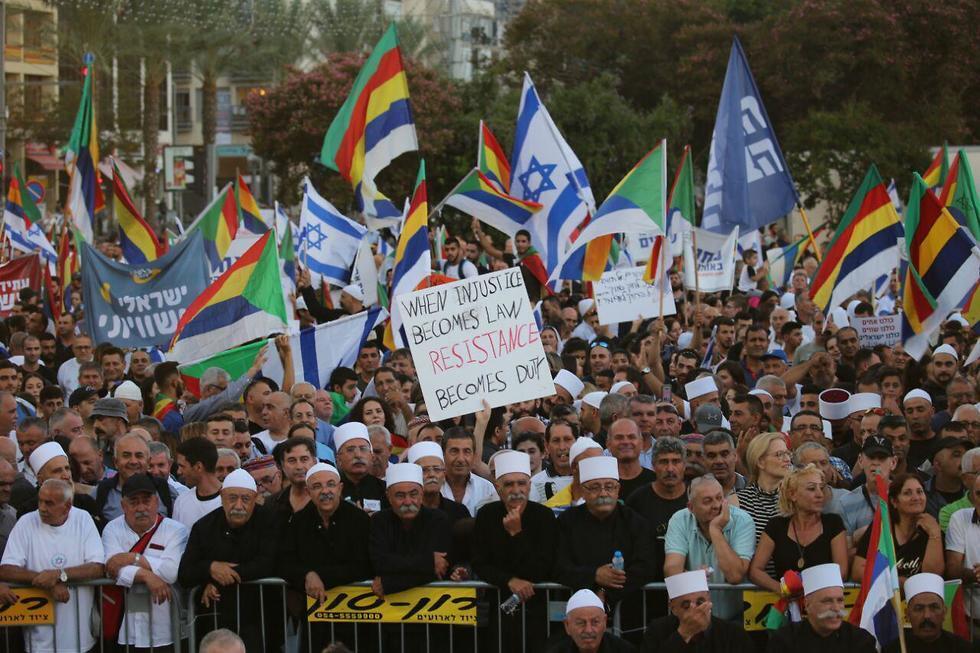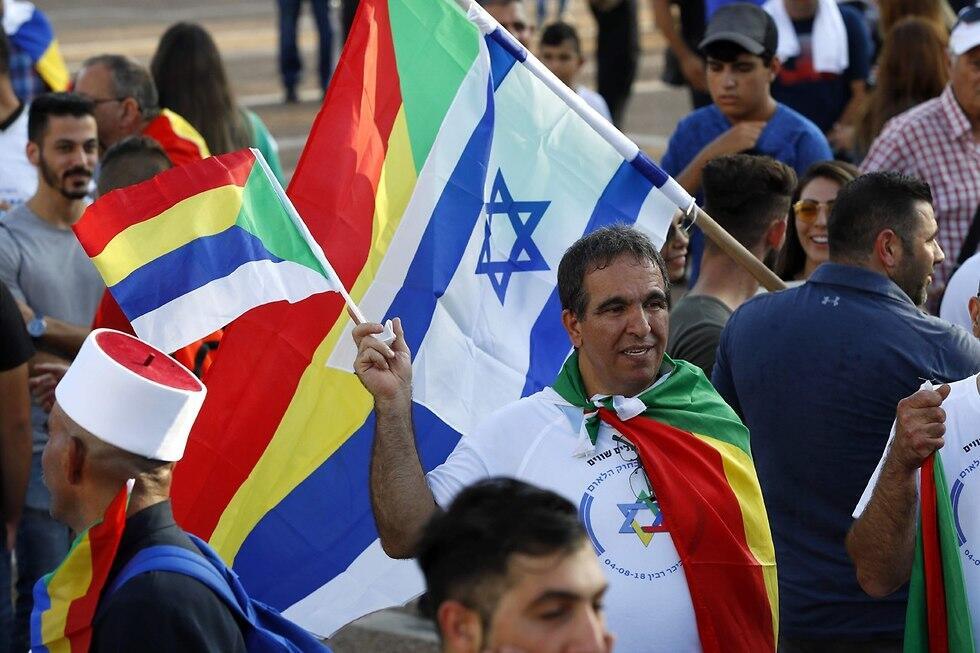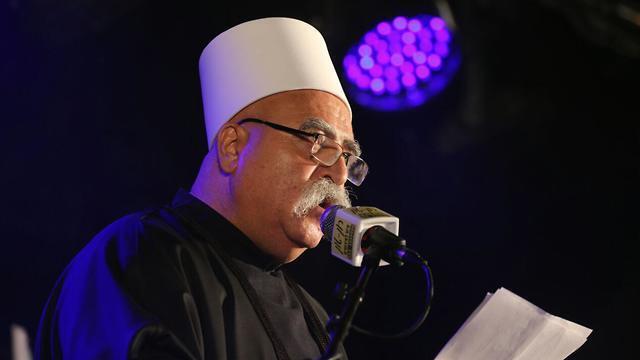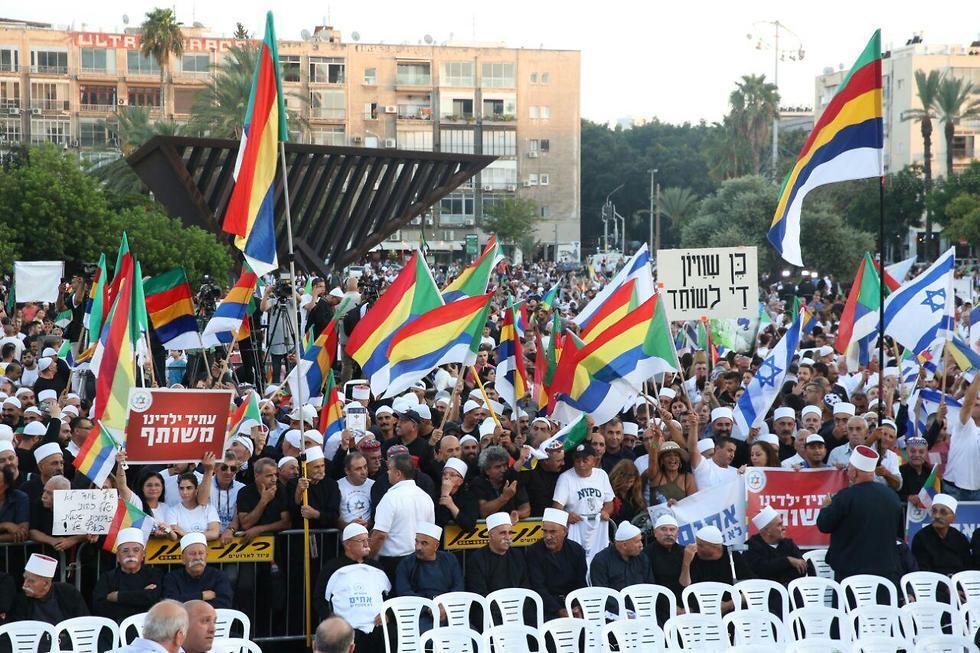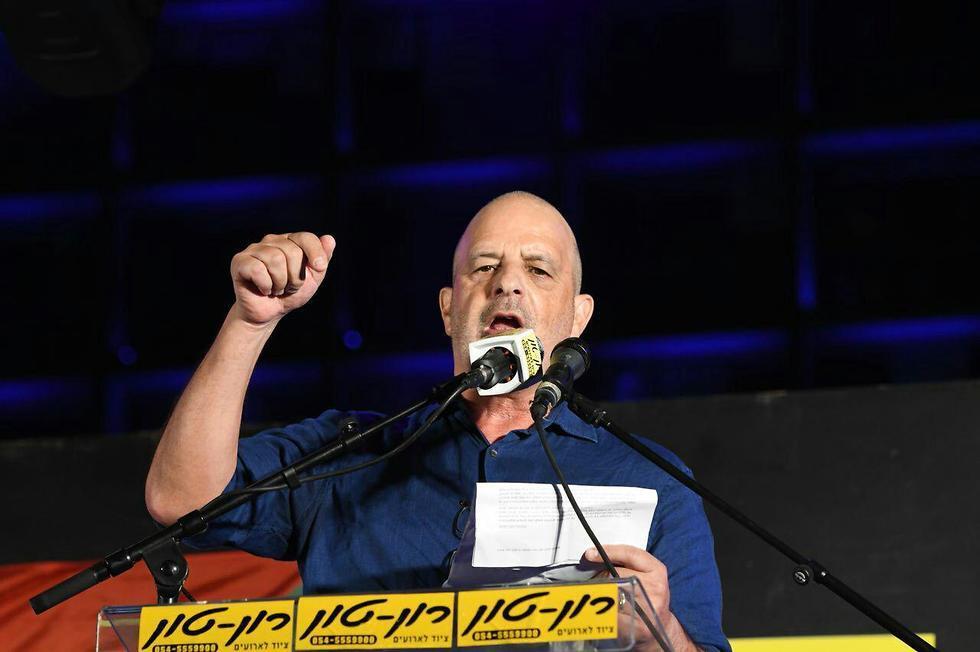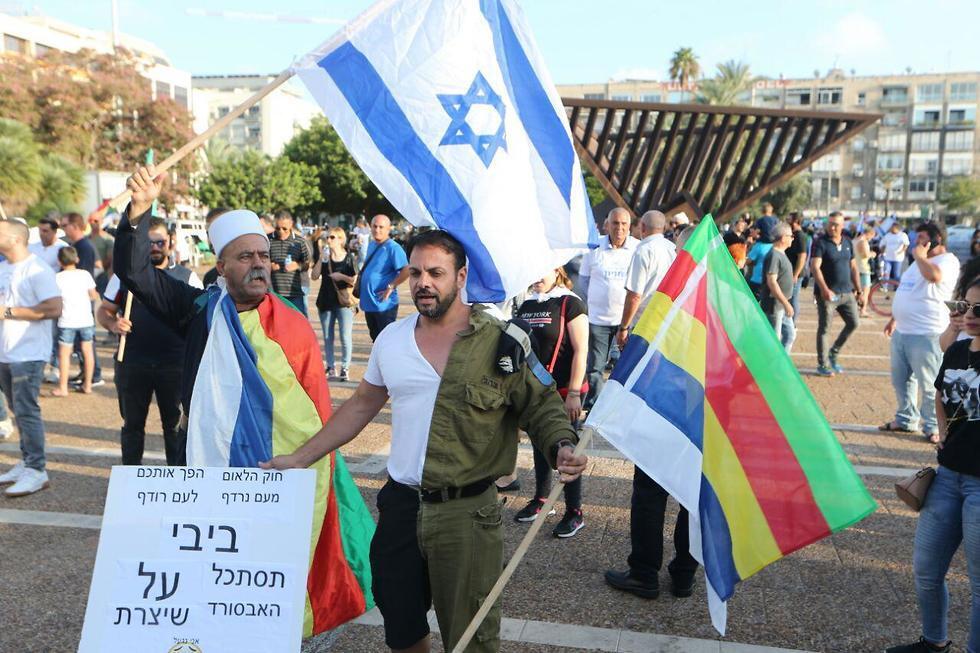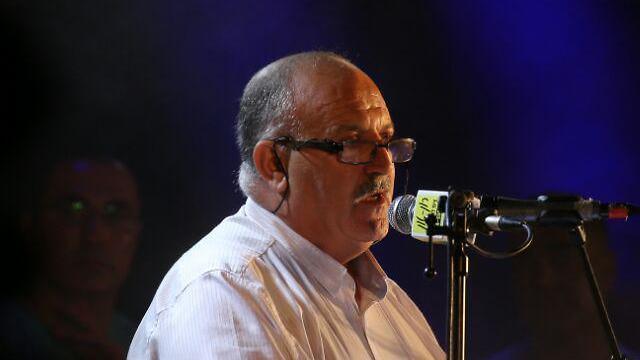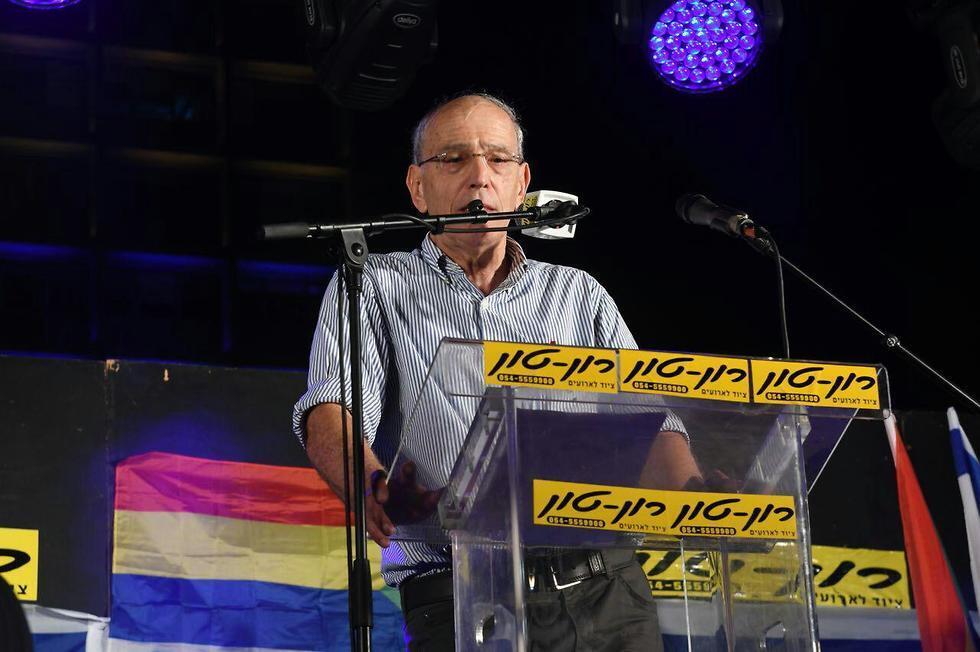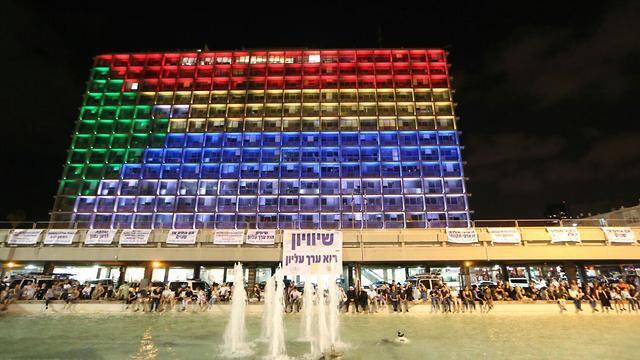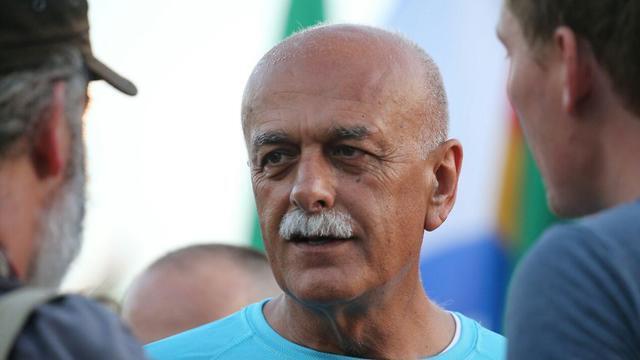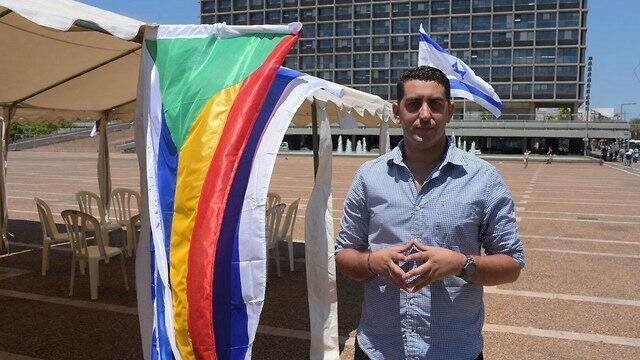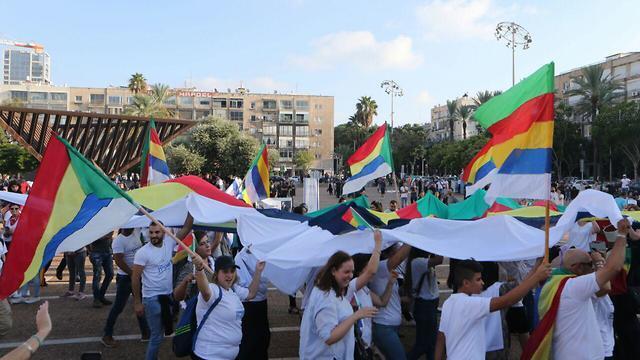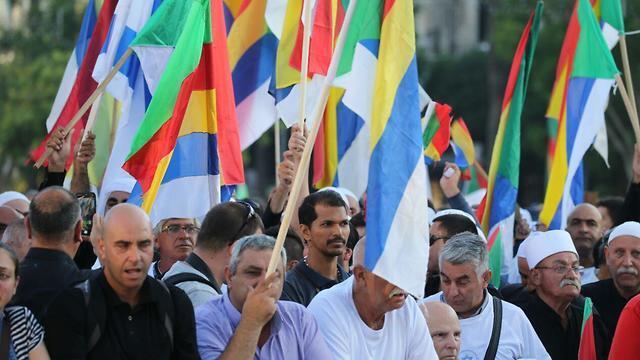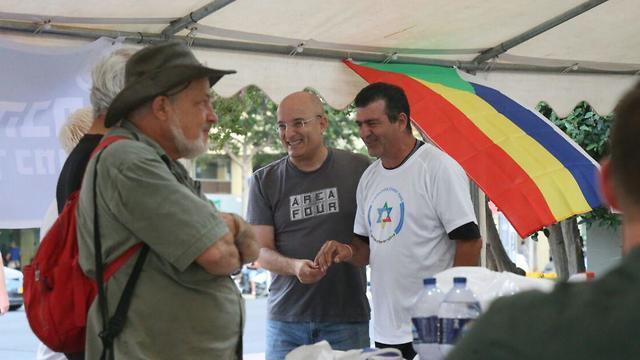Getting your Trinity Audio player ready...
Over 90,000 Druze and others opposing the Nationality Law flooded Rabin Square in Tel Aviv on Saturday evening for the "Rally for Equality."
Prominent Druze figures—among them Sheikh Mowafak Tarif and Brig. Gen. (res.) Amal Asad—former senior defense officials—including former IDF chief Gabi Ashkenazi, former Mossad directors Tamir Pardo and Efraim HaLevy, and former Shin Bet director Yuval Diskin—as well as politicians—including Tel Aviv Mayor Ron Huldai, MK Yair Lapid and former minister Matan Vilnai—took part in the rally.
Druze religious leader Sheikh Mowafak Tarif was the first to speak at the rally.
"I'm not a political person, and I'm not used to making speeches at the city square, but I'm speaking here tonight as one whose love for the land the state is absolute and unequivocal. I came here to tell you simple truths that come from the heart. I do not seek popularity, and what guides me is the best interest of my country and my sector," Tarif began.
"We're all proud of the democratic and free State of Israel, where human dignity and freedom are the supreme values. We've never doubted the Jewish identity of the state. We recognized its Jewish character with full equality for its non-Jewish citizens," he continued.
"No one can teach us what sacrifice is, and no one can preach to us about loyalty and devotion—the military cemeteries are a testament to that. We are determined to fight alongside you for the state's character and the right to live in it with equality and dignity," the sheikh declared.
"Despite our unconditional loyalty to the state, the state doesn't see us as equals," he lamented. "The cry of the Druze community is real. They feel justifiably that someone seeks to take their Israeliness away."
"We identify with the state and the Declaration of Independence," Tarif stressed. "Last Independence Day, I lit a torch for coexistence, the alliance between the Jewish people and the Druze people, and for the glory of the State of Israel."
Turning to the massive audience, he said, "I see the masses that came to show their solidarity, and it warms our hearts. I thank you on my behalf and on behalf of my Druze brothers. This is the beautiful Israel, ladies and gentlemen."
Referring to the outline proposal by Prime Minister Benjamin Netanyahu to resolve the crisis, Tel Aviv Mayor Ron Huldai urged the Druze community, "do not fall into the honeytrap offered to you. This is another attempt to divide. To mark who is inside and who is outside, and everyone outside is the enemy."
"I know how much courage and determination are required for you to be standing here. And still, keep fighting alongside us, so the nation state of the Jewish people continues being democratic and equal," the Tel Aviv mayor continued.
Huldai went on to accuse that "What was so simple about the Declaration of Independence was intentionally left out of the Nationality Law, which—as part of an ongoing process—excludes the woman, the LGBT, the Reform, the Conservative, the Circassian, the Bedouin, the Arab, and yes, you too, our blood brothers the Druze."
Former Shin Bet director Yuval Diskin aimed his criticism at the government. "I'm not a member of the Druze community, so I'm allowed to be less politically correct," he prefaced.
"I can't help but say a few words about the legislators who passed the law. I won't stoop to the level of personal insults or incitement—as I and others have been experiencing in recent days from a mob of racist and violent internet commeters—or to the mouthful of comments from the poodles sent to the PR front, while making lies meant entirely to increase the division and hatred among the people," Diskin charged.
"The truth has to be said," he insisted. "I respect many people in the true ideological right wing, but I have no respect for the fake populist Right. True, ideological, courageous, liberal Right—that loves the State of Israel and the people of Israel—was the Right led by the late Menachem Begin, who is certainly turning over in his grave after seeing what his successors in the Likud Party are doing."
Diskin asserted that "the Nationality Law was not passed to strengthen the State of Israel as the home of the Jewish people, it was meant to serve petty and pitiful political needs. This is a law that seeks to undermine the firm foundations built over decades, to divide, to increase the hatred among us—all out of short-term thinking motivated by the upcoming elections."
The Declaration of Independence, Diskin said, determines that "minorities in the State of Israel can also live in dignity, because it calls for full civil rights equality."
The Nationality Law, he argued, "drops, and not by chance—but intentionally—the value of equality. And there is no mistake here, there is intention."
Former MK Shachiv Shnaan ,who lost his son, Border Policeman Kamil Shnaan, in a terror attack on the Temple Mount ,said that "on July 18, the Nationality Law made me realize I was a second-class citizen, and my son became a second-class fallen soldier."
"I went to the Knesset and asked the legislators not to pass the law, not to sully the law book... it didn't help," Shnaan said.
"With that in mind, I'll say: Before the law and after it, I was and I remain a proud Druze Israeli," he declared.
"My heart goes out to the entire family of bereavement, regardless of gender, race or religion. We will carry on, with teary eyes and a bleeding heart, because life doesn't stop. And we will do everything to prevent more bereavement, and instead sow peace, hope, equality, love and a shared life. Long live the State of Israel, long lives the Druze community."
"For 70 years, you've been fighting with us to protect the shared homeland. Now, you're being called to join and lead our fight to save our democracy," said former State Attorney Moshe Lador.
"The Nationality Law determines different statuses, and our law book has been sullied. From a legal standpoint, there is no doubt the law in its own right will affect authorities and court rulings, including the High Court of Justice. For example, when there is a dispute between Jews and minorities on settling Jews in the country, there will be those who will claim the court should give preference (to Jews) in its rulings, because this is what the legislator ordered," Lador explained.
He asserted that "there are no alternatives in the form of generous benefits in compensation for the anguish the Basic Law caused you, no alternative are enough to buy your willingness to perpetuate the humiliation in downgrading your status as proud citizens of this country. This law is unlawful in essence."
During the Tel Aviv municipality building, which overlooks the square, was lit up in the colors of the Druze flag.
Brig. Gen. (res.) Amal Asad read out the beginning of the Declaration of Independence, adding, "After this rally, in which we joined hands and hearts, we'll have more years of shared life in the State of Israel in the spirit of the Declaration of Independence. We're ready to have dialogue with any government official to resolve the issue for the future of our children."
Ahead of the rally, Asad called on all Israelis to stand with the Druze. "We, senior army officers who served the country for decades and lost friends, soldiers and family, want to keep our 'Israeliness' and believe the Israeli government and its leader have the ability to do so in order to amend the Nationality Law," he said.
Organizers erected a tent in the square, draped in the colorful Druze flag as well as the Israeli flag. Tables and chairs were set up for passersby to engage in dialogue regarding the problematic elements of the law.
Jaber Habish, 35, an IDF officer in reserves and one of the organizers, said that the purpose of the tent is to raise awareness about the law. “We will try to inform the entire nation that the struggle is not that of the Druze alone,” said Habish.
“Anyone who feels Israeli and wants the state to continue to promote equality should come. We are the moderate voice of the nation and are in practice fighting on two fronts: in the IDF, and now (for equality)," he explained.
“I and many young Druze are heavily involved in building the state. When I first heard of the law I felt unwanted, that I was being removed from the inner circle. Until now, I felt like an Israeli, a partner of the Jews, and suddenly my partner says I am an outsider,” Habish added.
“The Nationality Law forgot me, denied me rights and now I don’t feel like an equal,” he continued. “The Druze street is crying out and we will fight for our well deserved rights until the end. The state is heading towards a divide and we want to be the right marker in the struggle for equality.”
On Saturday afternoon, some 2,000 people took part in protests against the law in Arab cities and towns. Among others, protests took place in Umm al-Fahm, Ar'ara, Tira, Sakhnin, Kafr Kanna, Rahat, Baqa al-Gharbiyye and Majd al-Krum. Protesters called to cancel the law and threatened to take further steps against it.
"All non-Jewish citizens aspire to coexistence and want to live together in peace," said Tayibe Mayor Shuaa Mansour Massarwa. "This government is becoming more and more extremist in a worrying manner and trying to banish us from our lands."
Ali Badran, a resident of Wadi Ara, told Ynet he was disappointed of the sparse participation in the protests. "We won't be able to cancel the racist law this way. A considerable part of the Arab population is simply not interested in what's going on, and we have to think of new ways to help us save the situation," he said.
The High Follow-Up Committee for Arab Citizens of Israel, which organized the protests, will make its way from Kafr Qara to the government buildings in Jerusalem in a convoy on Wednesday.
Prime Minister Benjamin Netanyahu abruptly ended a meeting on the Nationality Law with Druze leaders on Thursday after one of them, Brig. Gen. (res.) Amal Asad, called Israel an "apartheid state" in a Facebook post.
Netanyahu said he would not tolerate such an offense both to the prime minister Israel and to the State of Israel itself. Some Druze mayors refused to attend the meeting.
Asad accused Netanyahu of planning the incident. "He had no intention of listening us, the officers who have a position contradictory to his own," Asad claimed. "He planned to come and take photos with the dignitaries, and say he's establishing committees. We came to present our positions."
Elsewhere, during a scholarship ceremony for Druze students at the ORT Braude College of Engineering, several Druze activists against the Nationality Law ran onto the stage and interrupted remarks by Likud MK Avi Dichter, one of the legislation's sponsors.
The protesting activists were led by Dr. Amir Hanifes, who represented the Druze community in the Knesset discussions on the law. Another activist called Dichter "racist" and "Nazi."
Police officers who were called to the scene removed the two protesters from the ceremony.
Itay Blumenthal, Roi Rubinstein, Hassan Shaalan and Raanan Ben Zur contributed to this story.
First published: 19:08, 08.04.18


